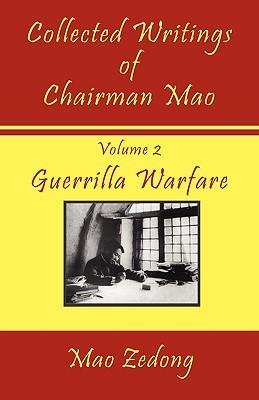
Book
Collected Writings of Chairman Mao: Volume 2 - Guerrilla Warfare
by Mao Zedong & Mao Tse-Tung
(Write a Review)
Paperback
$19.95
*Part 2 - Problems of Strategy in Guerrilla War against Japan
*Part 3 - On Protracted War
Excerpt from "Collected Writings of Chairman Mao: Volume 2 - Guerrilla Warfare" by Mao Zedong.
Reprinted by permission. All rights reserved. In September 1812, Napoleon, in the course of swallowing all of Europe, invaded Russia at the head of a great army totaling several hundred thousand infantry, cavalry, and artillery. At that time, Russia was weak and her ill-prepared army was not concentrated. The most important phase of her strategy was the use made of Cossack cavalry and detachments of peasants to carry on guerrilla operations. After giving up Moscow, the Russians formed nine guerrilla divisions of about five hundred men each. These, and vast groups of organized peasants, carried on partisan warfare and continually harassed the French Army. When the French Army was withdrawing, cold and starving, Russian guerrillas blocked the way and, in combination with regular troops, carried out counterattacks on the French rear, pursuing and defeating them. The army of the heroic Napoleon was almost entirely annihilated, and the guerrillas captured many officers, men, cannon, and rifles. Though the victory was the result of various factors and depended largely on the activities of the regular army the function of the partisan groups was extremely important. The corrupt and poorly organized country that was Russia defeated and destroyed an army led by the most famous soldier of Europe and won the war in spite of the fact that her ability to organize guerrilla regimes was not fully developed. At times, guerrilla groups were hindered in their operations and the supply of equipment and arms was insufficient. If we use the Russian saying, it was a case of a battle between "the fist and the axe."
*Part 2 - Problems of Strategy in Guerrilla War against Japan
*Part 3 - On Protracted War
Excerpt from "Collected Writings of Chairman Mao: Volume 2 - Guerrilla Warfare" by Mao Zedong.
Reprinted by permission. All rights reserved. In September 1812, Napoleon, in the course of swallowing all of Europe, invaded Russia at the head of a great army totaling several hundred thousand infantry, cavalry, and artillery. At that time, Russia was weak and her ill-prepared army was not concentrated. The most important phase of her strategy was the use made of Cossack cavalry and detachments of peasants to carry on guerrilla operations. After giving up Moscow, the Russians formed nine guerrilla divisions of about five hundred men each. These, and vast groups of organized peasants, carried on partisan warfare and continually harassed the French Army. When the French Army was withdrawing, cold and starving, Russian guerrillas blocked the way and, in combination with regular troops, carried out counterattacks on the French rear, pursuing and defeating them. The army of the heroic Napoleon was almost entirely annihilated, and the guerrillas captured many officers, men, cannon, and rifles. Though the victory was the result of various factors and depended largely on the activities of the regular army the function of the partisan groups was extremely important. The corrupt and poorly organized country that was Russia defeated and destroyed an army led by the most famous soldier of Europe and won the war in spite of the fact that her ability to organize guerrilla regimes was not fully developed. At times, guerrilla groups were hindered in their operations and the supply of equipment and arms was insufficient. If we use the Russian saying, it was a case of a battle between "the fist and the axe."
Paperback
$19.95